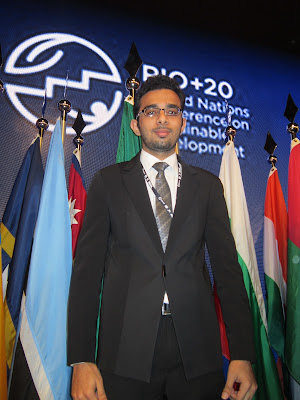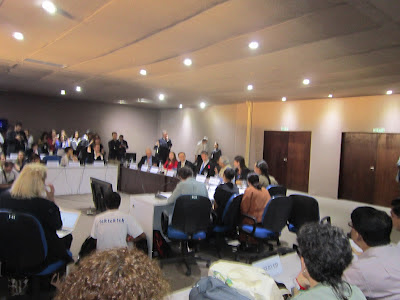June 16, 2012; Today
was a really hectic and tiring day on following negotiations and making the
strategies for upcoming days, in the morning I attended a side event organized
by UNEP, UNDP and UNDESA on “The UN system Perspectives on Green Economy”
The Environment
Management Group presented the findings of its report, working towards a
balanced and inclusive green economy: A UN system-wide perspective" which
was prepared to contribute to the Rio+20 Conference. The report prepared by 40
UN entities provides a picture on the UN system wide perspectives on the green
economy and how the UN system could coherently support countries in
transitioning to a green economy. The report is expected to facilitate a common
understanding of the green economy approach and the measures required for the
transition.
The panelists discussed on Fossil fuel
subsidies, this is a factor which counteract the transition from brown to green
economy to build a cleaner, safer, and healthier planet to everyone. Forest eco
system plays a crucial role in Green Economy and as a global carbon sink-age,
deforestation contribute around 30% of the GHGs emission which cause global
warming. One of the panelists highlighted on visible and invisible
infrastructure on Green Economy, Visible infrastructures such as Sustainable
Cities, Green Transports, Green Jobs etc, and invisible infrastructure such
taxes, laws and legislation etc.
The session highlighted how UN
agencies can promote Green Economy, UN agencies plays a crucial role in analyze
the policies, offer them the technical support, coordinate the process and
built the Capacity on Green economy policies. It is necessary to link the
existing mechanisms with the new and emerging mechanisms. Industry plays an
important role in green economy in-terms of consumption and production,
technologies and innovations will lead to a low carbon future as well. In terms
of youth perspective awareness among youth has become a necessary step, because
we the youth will be the biggest consumers in the future, Another panelist suggested Green Economy
should based on science and it should
facilitate basic fundamental rights for water, food, air etc.
Side Event
Exhibition Side
Exhibition Side
In terms of negotiations June 16, was not very active day, but Rio+20 Secretariat released the latest document of the Prepcomm III, A short plenary was organized around 03.00pm to give some glimpse about the upcoming negotiations. The chair proposed to divide the negotiations into 4 groups – coordinated by Brazilians leaderships, the tasks would be on IFSD, MOI, SDGs, Oceans.
MGCY Meetings
Plenary At 3.00pm
Attended the MGCY briefing meeting where we made some strategies on Action for upcoming days, some of the auctions were proposed such as Flash Mob, Marches and etc.
Around 8.30pm the secretariat called for plenary to talk with each other and have a first overview on the text. Text was an attempt to follow-up on prepcom and this week. Keeping paragraphs agreed ad ref, consolidate the rest. Implies choices, which are not easy. Assure you that we tried to keep a certain balance between blocks and countries.
Plenary at 8.30pm
Canada: very initial reaction.
- Helpful to have a readable text.
- Number of very serious things missing.
(?)
EU:
- IFSD, great importance for EU, want a
strengthening of IFSD, both SD and environment. After initial reading: some key
issues missing, not ambitious enough, not responding to the challenges.
- Green economy: I didn’t see where I
should be happy. Unhappy after first reading. We have not been heard, cross
cutting issues: CBDR, SDGs, launch of process of heads of state is extremely
concerning. Level of ambition is concerning.
Switzerland:
- Many parts good work. On many areas
found the middle ground.
- Many issues where we hoped for a more
ambitious agreement.
- We could accept these if others do
also so.
- Have feeling that some paragraphs
agreed ad ref are lacking.
- Work on some topics. Should be more
ambitious.
USA
- Similar to Canada
- Number of very serious concerns. Will name
them during the sessions tomorrow.
- Share the concerns on the MoI
Algeria/G77 and China
- Text can reassure that there is an
outcome which will be a reflection of the positions of the membership.
- Preliminary:
o To many
issues to be addressed
o Don’t want
to discourage, but list of issues is growing every minute.
o Lack of
ambition for MOI
o What are we
going to take back with us.
o Only
processes and concepts to be developed in the future.
o IFSD: some
who believe that it needs clarification.
o SDGs have
raised many issues.
o Green
economy, renewing political commitment needs to be seriously be addressed, we
still need to work hard. We are willing to reach a balance.
As a overall the the member states appreciated the Co-chair
and the working groups for their effort to draft the text, which was not scene
in last informals.

+at+the+high+level+segment+of+the+Closing+ceremony+of+Rio+20.jpg)
































